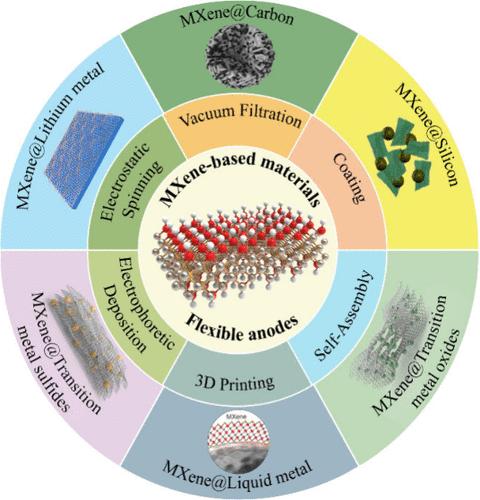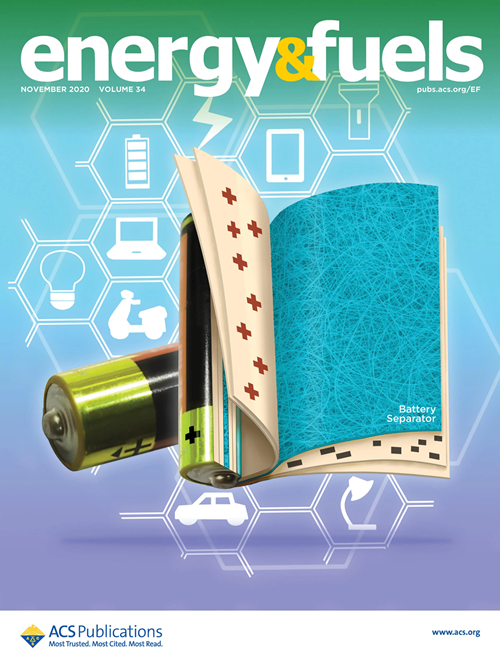基于 MXene 的混合物在制造先进锂离子电池柔性阳极中的作用:小型综述
IF 5.3
3区 工程技术
Q2 ENERGY & FUELS
引用次数: 0
摘要
柔性轻质储能电池在可穿戴电子设备、卷轴式显示器和便携式小工具应用方面具有巨大潜力。然而,要制造出具有坚固机械性能和优异电化学性能的柔性电极仍是一项挑战。MXenes 是典型的二维过渡金属碳化物、碳氮化物和氮化物,具有高导电性、坚固的机械柔韧性和丰富的官能团,因此是柔性电极的理想候选材料。本综述旨在全面综述在开发作为先进锂离子电池柔性电极的二氧化二烯及其混合物方面的最新进展,包括二氧化二烯基材料的合成、表征和结构改性,以及它们从基础到各种应用改善电化学性能的能力。此外,还深入讨论了用于制造柔性电极的 MXenes 与不同成分(如碳材料、硅、过渡金属氧化物/硫化物、液态金属和锂金属)之间的各种集成策略,并研究了 MXenes 对混合材料的影响,如导电性、电化学/机械/热稳定性和集成能力。最后,介绍了基于 MXene 的混合电极的未来挑战/前景。本文章由计算机程序翻译,如有差异,请以英文原文为准。

Roles of MXene-Based Hybrids in Fabricating Flexible Anodes for Advanced Lithium-Ion Batteries: A Mini Review
Flexible, lightweight energy-storage batteries have great potential for wearable electronics, rollup displays, and portable gadget applications. However, the ability to make flexible electrodes with robust mechanical properties and excellent electrochemical performance remains challenging. MXenes are typical two-dimensional transition metal carbides, carbonitrides, and nitrides and are promising candidates for flexible electrodes due to their high electrical conductivity, robust mechanical flexibility, and abundant functional groups for integrated compatibility. The aim of this review is to provide a comprehensive overview of recent advances in developing MXenes and their hybrids as flexible electrodes for advanced lithium-ion batteries; this includes the synthesis, characterization, and structural modification of MXene-based materials and their ability to improve electrochemical performance from the viewpoint of fundamental to various applications. The various integration strategies between MXenes and different components (such as carbonous materials, silicon, transition metal oxides/sulfides, liquid metal, and lithium metal) used to fabricate flexible electrodes are also thoroughly discussed, and the effects of MXenes on hybrids, such as conductivity, electrochemical/mechanical/thermal stability, and integration ability, are investigated. Finally, future challenges/perspectives of MXene-based hybrid electrodes are provided.
求助全文
通过发布文献求助,成功后即可免费获取论文全文。
去求助
来源期刊

Energy & Fuels
工程技术-工程:化工
CiteScore
9.20
自引率
13.20%
发文量
1101
审稿时长
2.1 months
期刊介绍:
Energy & Fuels publishes reports of research in the technical area defined by the intersection of the disciplines of chemistry and chemical engineering and the application domain of non-nuclear energy and fuels. This includes research directed at the formation of, exploration for, and production of fossil fuels and biomass; the properties and structure or molecular composition of both raw fuels and refined products; the chemistry involved in the processing and utilization of fuels; fuel cells and their applications; and the analytical and instrumental techniques used in investigations of the foregoing areas.
 求助内容:
求助内容: 应助结果提醒方式:
应助结果提醒方式:


